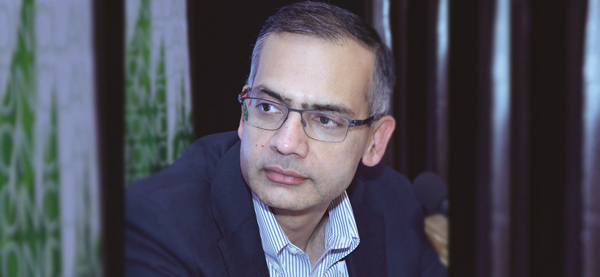With growing emphasis on digitalization, a mandate driven by the top echelons of the government, and increasing focus on creating consumer education and brand awareness by online service providers, India was set to witness an exponential rise in the online space, reasoned Virendra Jain, Director – Business Development, Asia Pacific, Phocuswright. In a detailed interaction with TourismFirst, he talked about the future of online space, its possibilities and how all was not yet lost for traditional players.
 Technology is constantly altering established notions and opening up unheard and unimaginable avenues in the realm of tourism and travel. However, nowhere had the all-pervasiveness of technology been more visible and impactful than in the railways, shared Virendra Jain. “A good way to look at the inception and the growth of the online space in the country is the use of technology by the railways into its day-to-day consumer interface; railways has long been the backbone of travel and tourism in the country,” he substantiated. Adding that from the offline era to buying tickets online, the segment had seen a massive transformation, he said “With the infusion of technology, the Indian railways is looking at concepts like dynamic pricing which could bring ticket costs at par with air tickets, and yet people are willing to buy and travel is a good indicator of how far we have come in the last decade.”
Technology is constantly altering established notions and opening up unheard and unimaginable avenues in the realm of tourism and travel. However, nowhere had the all-pervasiveness of technology been more visible and impactful than in the railways, shared Virendra Jain. “A good way to look at the inception and the growth of the online space in the country is the use of technology by the railways into its day-to-day consumer interface; railways has long been the backbone of travel and tourism in the country,” he substantiated. Adding that from the offline era to buying tickets online, the segment had seen a massive transformation, he said “With the infusion of technology, the Indian railways is looking at concepts like dynamic pricing which could bring ticket costs at par with air tickets, and yet people are willing to buy and travel is a good indicator of how far we have come in the last decade.”
Arguing that the online segment had evolved over the course of the last decade, he noted that it had considerably lent to ease of travel. Referring to the evolvement of the OTA space in the country, he pointed out that these platforms had become important mechanisms for the penetration of the airline segment into the masses. “I think, apart from these platforms taking to railways and the aviation segment, the process of online education and trust has grown in a substantial manner. The ease with which online payments are being carried out and the trust that the masses have reposted in these online mediums have played a crucial role in the evolvement of the online space in the country,” he said.
Further delving into intricacies of the growth of the airline segment, he reasoned that “a fast swelling middle-class with rising disposable incomes, who view travel not as luxury but as a necessity has expedited the process.”
“Distribution platforms have evolved, bringing down prices and have made air-travel more affordable for a larger number of people,” he added. Apart from infusion of technology, the growth of the online space could partly also be credited to an array of home-grown and global OTAs that have spent considerable sums in building their brand awareness and educating consumers about the online space.
Assessing the impact of digitalization, he drew parallel with China, sharing that, both, the concepts of mobile booking and cash-on-delivery started fairly late. “In 2011, the penetration of mobile booking was in the lower single digit, but now almost half of the total gross booking revenue comes from mobile channels,” he said. He stressed that it was a government mandate which had led to serious efforts in that direction, leading to a surge in users. Adding that the Indian government was looking at digitalization as a policy level mandate, driven from the very top, “the process has already started in India,” he said. However, there was still a fair degree of work remaining to be done, Virendra Jain added. “Consumers still do not understand the difference between a metasearch engine and a travel agency. But Indian consumers are very comfortable with the online space, and also with OTAs focusing on consumer education, things are looking good.”
To his understanding, the key differentiator between Indian consumers and users of online services in the rest of the world was that Indian consumers were value conscious buyers. “The consumer is price sensitive. Look at how the aviation sector has unfolded. Nowhere else in the world do LCCs get the degree of distribution from online channels. IndiGo drives a sizable chunk of its distribution through OTAs. This is very peculiar of the Indian market,” he said.
Offline players must focus on niche segments
While it remains true that technology has made it difficult for traditional players to compete with a new-breed of OTAs, but given that several niche segments are still in a nascent stage in India, it could emerge as an area where traditional players could find a footing in years to come.
It is always difficult to predict the future of the online space, especially when newer inventions and technologies make it a vibrant market space. While the growth of technology has certainly improved ease of travel and given consumers a larger bouquet of offerings to choose from, this development has instilled a sense of fear in the traditional travel agent and tour operator community – who view these developments as a serious threat to their survival. The financial clout wielded by OTAs, backed by millions of dollars of investments, coupled with their ubiquitous online presence make it a battle of unequal entities. “The transactional and volume play for traditional players have ceased to exist. It is difficult to beat the pricing muscle of the OTAs,” noted Virendra Jain. “That canvas is simply not there anymore,” he said. Mentioning that the industry was moving in a direction where mobile was being viewed as the primary channel for travel related business, he argued that “user interface and designs have become integral part of the modus operandi for service providers.”
However, he argued that while the threat was real, it was also an opportunity to evolve and look at specializations. Stressing that travel and tourism was one of the only industries which was experiential in nature, he said there were niches in which traditional players could still find good business. “In mature markets like the USA, while the numbers of offline players have come down quite significantly, but their overall gross bookings have pretty much remained the same,” he said. He explained that many traditional players in mature markets were focusing on delivering experiences in niche segments, and Indian tour operators and travel agents could examine a similar way forward. “Cruising industry is still in a nascent stage in India, and holds tremendous possibilities. “May be, it is a segment traditional players could focus their energies on,” he said.




































